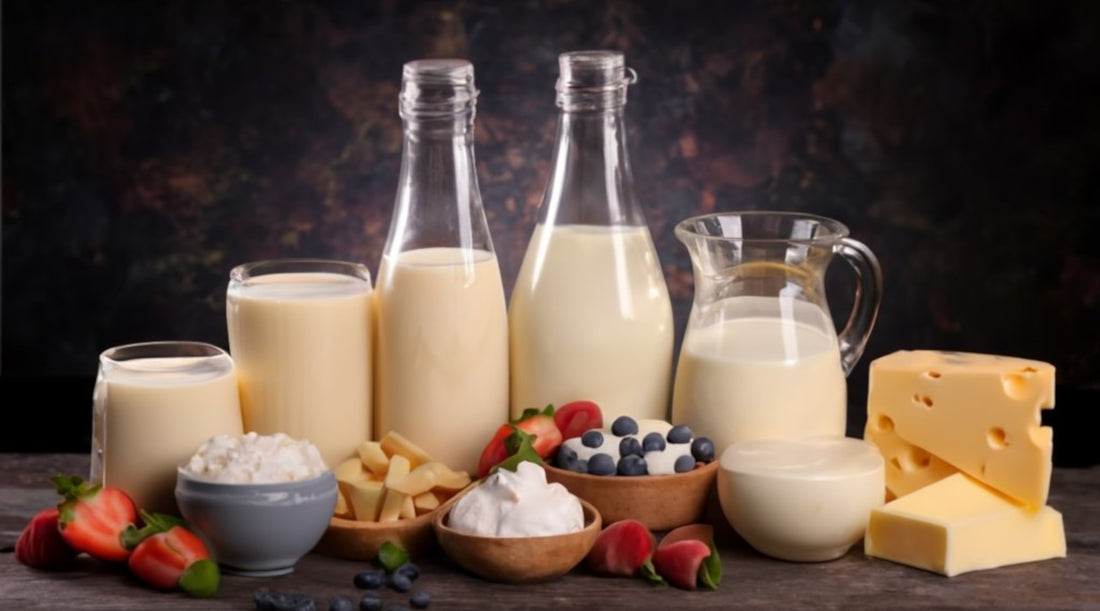Dairy products have been a staple in many diets around the world, providing a rich source of calcium and other essential nutrients. However, the modern dairy industry is not without its pitfalls. This article aims to shed light on the often-overlooked dangers associated with consuming dairy products, specifically focusing on the chemical and antibiotic issues stemming from how cows are raised.
Chemical Residues in Dairy Products:
Hormones and Growth Promoters: The conventional dairy industry frequently employs synthetic hormones and growth promoters to enhance milk production. Recombinant bovine growth hormone (rBGH) is one such synthetic hormone used to stimulate milk production in cows. Research suggests that the consumption of products derived from rBGH-treated cows may be linked to health issues in humans, including an increased risk of certain cancers.
Pesticides and Herbicides: Cows raised for conventional dairy often graze on pastures treated with pesticides and herbicides. Residual traces of these chemicals can find their way into the milk and dairy products. Chronic exposure to these substances has been associated with adverse health effects, such as disruptions in the endocrine system and potential carcinogenicity
Antibiotic Use in Dairy Farming:
Overuse of Antibiotics: Antibiotics are routinely administered to dairy cows to prevent and treat infections. However, the misuse and overuse of antibiotics in the dairy industry have led to the development of antibiotic-resistant strains of bacteria. Consumers may unknowingly ingest antibiotic residues in dairy products, contributing to the global crisis of antibiotic resistance.
Impact on Human Health: Consuming dairy products containing antibiotic residues poses a significant risk to human health. The World Health Organization (WHO) and other health authorities warn that antibiotic resistance jeopardizes the effectiveness of these crucial drugs, making it harder to treat common infections and increasing the risk of severe illnesses.
Casein in Dairy Products
Casein, a protein found in abundance in dairy products, has been a subject of increasing scrutiny due to its potential health implications. Some studies suggest that casein, particularly the A1 variant found in certain cow breeds, may be associated with various health issues, including digestive discomfort and inflammatory responses. Moreover, concerns have been raised about the possible link between casein consumption and an increased risk of certain chronic diseases.
The China Study, a landmark epidemiological research project led by Dr. T. Colin Campbell, investigated the dietary habits of different populations in China and found correlations between the consumption of animal proteins, including casein from dairy, and the prevalence of diseases like heart disease and certain cancers. The study suggested that populations consuming predominantly plant-based diets exhibited lower rates of these diseases, indicating a potential health benefit in reducing or eliminating animal protein, including casein, from the diet.
While further research is needed to establish definitive causal relationships, these findings contribute to the ongoing discussion about the health impact of casein in dairy products and the potential benefits of plant-based alternatives.
Sustainable Alternatives:
Organic and Grass-Fed Dairy: Choosing organic and grass-fed dairy products can mitigate some of the risks associated with conventional dairy farming. Organic farms typically prohibit the use of synthetic hormones, pesticides, and antibiotics, offering a cleaner and more sustainable option for consumers concerned about the impact of chemical residues.
Plant-Based Alternatives: An increasing number of plant-based alternatives, such as almond milk, soy milk, and oat milk, provide nutritious alternatives to traditional dairy products. These options eliminate the risks associated with chemical residues and antibiotic use in conventional dairy farming
While dairy products have long been celebrated for their nutritional value, it's crucial for consumers to be aware of the potential dangers associated with the modern dairy industry. From synthetic hormones to antibiotic overuse, the chemical and antibiotic issues in dairy farming underscore the importance of making informed choices about the sources of our dairy products. By opting for sustainable alternatives and supporting responsible farming practices, consumers can contribute to a healthier and more ethical food system.

